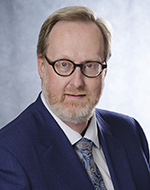Page Content
 Question: For more than 15 years, you’ve answered a lot of questions in this column and this is your last Q&A. You should get to answer your own question at least once. What would you like to ask and what’s the answer?
Question: For more than 15 years, you’ve answered a lot of questions in this column and this is your last Q&A. You should get to answer your own question at least once. What would you like to ask and what’s the answer?
Answer: Well, thank you. I’ve done about 275 Q&A columns for the ATA News. I’m retiring at the end of the month, so this is my last Q&A as executive secretary. I’m often asked about current issues that surface, and the column clarifies a current Association issue or concern. I’ve often been asked about ATA processes (how the fee is set, how the budget is made). One of the most often asked questions is about a teacher’s legal and professional obligation to attend teachers’ convention. And I’m always asked about bargaining.
My question is this: What would I like to see for the future of the profession? First, I’d like our members to have the resources they need to meet student learning needs. Although the government’s ongoing commitment to fund student enrolment growth is very helpful, there are urgent needs to resource the classroom.
|
Thank you for the honour of serving you.
|
Teachers require additional support, especially related to complex classrooms. Class sizes need to be smaller, and support for inclusive education needs to be much larger. I would hope that the new round of collective bargaining will make progress in all of these areas.
And I think we also have to say that we are done with zero per cent salary increases — five zeros in the past six years. The bargaining process is driven entirely by our members. A fair process exists in collective bargaining, and it’s up to our members to drive the process to a satisfactory outcome.
With respect to the profession itself, I strongly support a unified teaching profession based on strong collegial
relations. Quite simply, it’s the best way we have to ensure student learning needs are addressed. Working with colleagues in the school and across the system, all teachers work to achieve
their students’ learning needs. That’s the job of each teacher, and the role for the rest in the system is to support the teacher to do so.
A unified teaching profession would be made up of all certificate holders, and the ATA would look different than it does today. Our membership would include teachers, school administrators, central office teachers, superintendents, faculty of education staff, department staff, private and charter school teachers and other certificate holders. Our executive council would be drawn from all of the profession, and would include groups not currently represented (e.g., superintendents).
The profession would be responsible for setting professional conduct and professional practice standards and for ensuring that members meet those expectations. Policy positions would reflect a discussion among representatives of all members of the profession. A unified profession would strengthen the ability of the profession to act collegially to meet student learning needs.
Thank you for the honour of serving you. My friend and colleague Dennis Theobald, the ATA’s eighth executive secretary, will be taking over this space next issue. I’ll be reading and I hope you will too.
Magistri Neque Servi. ❚
